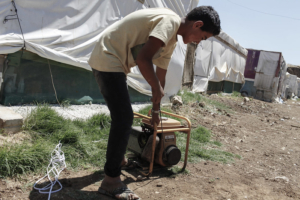How Regional Conflict Is Worsening Lebanon’s Electricity Crisis
 Since the end of the civil war in 1990, Lebanon has struggled with an electricity crisis due to a lack of investment in the state-run electricity provider Electricité du Liban (EDL) and misuse of funds by government officials. As a result, EDL can only provide electricity for as little as 1-2 hours each day in 2022, leaving the country in a persistent state of power shortages. Achieving 24-hour access to electricity is only possible through the use of private generators.
Since the end of the civil war in 1990, Lebanon has struggled with an electricity crisis due to a lack of investment in the state-run electricity provider Electricité du Liban (EDL) and misuse of funds by government officials. As a result, EDL can only provide electricity for as little as 1-2 hours each day in 2022, leaving the country in a persistent state of power shortages. Achieving 24-hour access to electricity is only possible through the use of private generators.
The severity of the outages varies significantly per region, with Beirut receiving an average of 21 hours of electricity a day. However, areas further from the capital receive much less, leading to higher private generator bills. The inconsistency of electricity from the state-run electricity provider has had significant implications for the population, especially the nation’s impoverished, who cannot afford to buy private generators. Lama Fakih, Middle East and North Africa director at Human Rights Watch explains that “Lebanon’s electricity crisis is leaving people in the dark and dramatically reducing people’s access to critical rights such as food, water, education and health care.”
The Impact of Regional War
Before the Lebanon-Israel conflict erupted, The National News reported that both sides had threatened to target energy infrastructure in the event of war. Such actions would disrupt essential services, including telecommunications, sanitation networks, irrigation systems and hospitals, all of which depend on electricity to operate.
Since October 2023, Hezbollah has launched airstrikes on Israel, stating that they would halt their actions in exchange for a ceasefire in Gaza. One year later, with no truce reached, Israel began launching heavy strikes on Lebanon. Approximately 60% of border communities in the south have sustained infrastructural damage, impacting residential buildings, roads, water supplies, electrical grids and telecommunications. This destruction has resulted in casualties among maintenance workers and health care staff, intensifying the existing energy crisis.
The war has further strained EDL, which struggles to meet demand even under normal circumstances. According to The Jerusalem Post, EDL recently announced a nationwide power shutdown, stating, “After exploiting all the other options to extend the duration of power production to the maximum possible, the company’s last power plant has ceased power supply across all Lebanese territories, due to a lack of fuel and with that, the power supply to all of Lebanon has been completely halted.” This shutdown affects critical facilities, including the airport, ports, water pumps, sewage systems and prisons.
Organizations on the Ground
Organizations working on the ground to help ease Lebanon’s electricity crisis include Aid Pioneers. This Berlin-based organization began its efforts in 2020, providing humanitarian relief following the Beirut port explosion. Aid Pioneers primarily focuses on medical procurement and clean energy access. Through partnerships with groups like the Altenburg Foundation and Ströer, it has raised millions of dollars, supporting 40,000 people across various projects.
Local organizations like the Lebanese Solar Energy Society (LSES) are also working to address Lebanon’s energy crisis. Operating since 1980, LSES focuses on providing sustainable energy solutions. Through public education on solar energy, high-quality technical support for efficient solar panel installation and ongoing advocacy, LSES aims to promote energy independence and long-term sustainability in Lebanon.
What Does the Future Hold?
With the ongoing conflict with Israel and continued infrastructure damage, Lebanon’s electricity crisis is expected to worsen. Humanitarian organizations and the government are increasingly focused on immediate security and humanitarian needs, often placing energy reforms on the back burner. The U.S. has attempted to broker ceasefire negotiations among the parties involved, but these efforts have remained inconclusive. According to Reuters, Hamas has rejected a temporary truce, stating that current ceasefire proposals do not meet its conditions.
Israeli officials have also indicated that diplomacy alone will not prompt a ceasefire, as it demands that Hezbollah comply with UNSCR 1701, which prohibits the presence of its fighters near the Israeli border. With no ceasefire in sight, a resolution to the crisis appears distant. Given that EDL struggled to meet demand even before the war, any improvements in the energy situation are likely to be minimal, even if all parties eventually reach a ceasefire agreement.
– Floria Persis
Floria is based in London, UK and focuses on Politics for The Borgen Project.
Photo: Flickr
